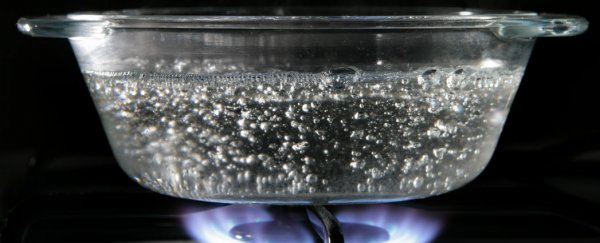Using a virus extracted from tobacco plants, scientists have managed to speed up the boiling process of water, which could have a great impact on the safety and efficiency of industrial power plants. But don't hold your breath for faster tea-making capabilities just yet.
Led by engineer Matthew McCarthy from Drexel University in the US, the team coated a heating element in the virus, called the tobacco mosaic virus, and watched as it actively cut down the size and number of bubbles that accumulated around the element as it heats up.
These bubbles, while a natural part of the boiling process, can hinder the transfer of heat from the element to the water, because they can accumulate on the surface in such numbers that they actually insulate the element from the water surrounding it. So less bubbles means a faster heat transfer.
The key to the success of this method is the strange shape of the tobacco mosaic virus - these organisms are long, thin, and pencil-shaped, and are equipped with tiny 'hooks' to help them grip on to any surface. So the team genetically engineered a strain of the virus that hooks on and grows vertically on the surface of a heating apparatus, assembling themselves like thousands of microscopic blades of grass. This 'grass' was then coated in a thin layer of nickel, which prevented the virus from moving around.
 Credit: Unknown author/Wikimedia
Credit: Unknown author/Wikimedia
Hannah Devlin explains the results of their lab test at The Guardian:
"The 'metallic grass' coating resulted in the boiling process occurring three times more efficiently. So if two pots of water - one with the tobacco coating, one without - were heated to the same temperature, the coated pot would produce twice as much water vapour. In a system designed to cool down a silicon electronic part, the coating almost tripled the temperature that the silicon could reach before critical heat flux occurred.
Another benefit of this simple technique is that it can guard against the dreaded 'critical heat flux' scenario, which occurs when a crazy amount of bubbles form around the heating element, and merge into one big bubble layer that stops the transfer of heat altogether. And this can be pretty disastrous in an industrial power plant or boiler environment, as you could probably imagine.
"What happens then is the dry surface gets hotter and hotter, like a pan on the stove without water in it," McCarthy told The Guardian. "This failure can lead to the simple destruction of electronic components, or in power plant cooling applications, the catastrophic meltdown of a nuclear reactor."
McCarthy added that in the future, this type of coating could not only be used in nuclear power stations, but also in "really kick-ass computers", presumably with a new kind of cooling system. If there's one thing we like, it's kick-ass computers, so thanks in advance, tobacco mosaic virus.
Source: The Guardian
